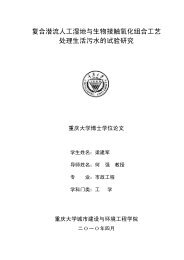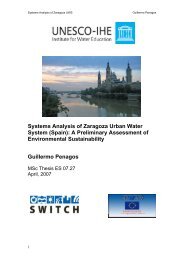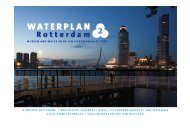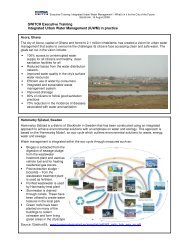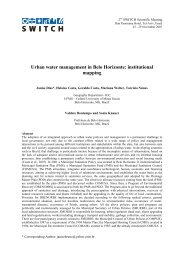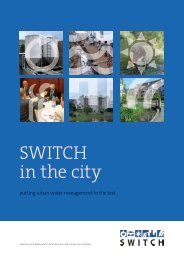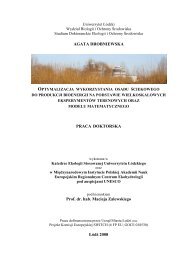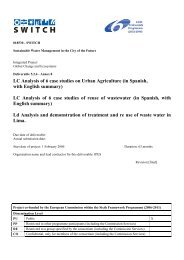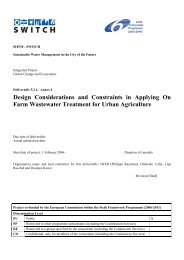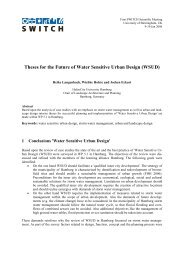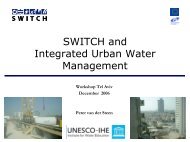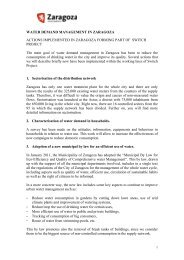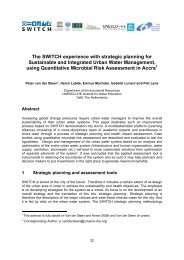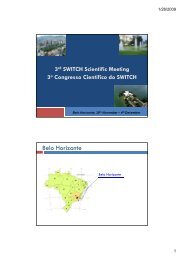Good practices for Social inclusion - Case studies and summary
Good practices for Social inclusion - Case studies and summary
Good practices for Social inclusion - Case studies and summary
You also want an ePaper? Increase the reach of your titles
YUMPU automatically turns print PDFs into web optimized ePapers that Google loves.
- Make it possible to take up the community health programme <strong>for</strong> existing<br />
groups, such as religious <strong>and</strong> women‘s groups, unless this means that<br />
interested persons will be excluded (They may <strong>for</strong> example involve only<br />
the locally better-off);<br />
- Adjust the contents to include implementation relevant subjects such as<br />
technology options with cost, O&M <strong>and</strong> management implications;<br />
- Build staff capacities to adjust the contents to local risks, e.g. helikopter<br />
toilets <strong>and</strong> brushing teeth <strong>and</strong> washing kitchen utensils with river water in<br />
river areas;<br />
- Include gender <strong>and</strong> poverty equity in the curriculum e.g. representation of<br />
women <strong>and</strong> the poor in local decision making meetings <strong>and</strong> bodies,<br />
accountability to users <strong>for</strong> local management <strong>and</strong> financing, <strong>and</strong> roles <strong>and</strong><br />
responsibilities of women <strong>and</strong> men in domestic <strong>and</strong> community<br />
environment, hygiene <strong>and</strong> health;<br />
- Make hygiene promotion sessions accessible to men <strong>and</strong> promote their<br />
participation through male communication channels. Accessibility may<br />
involve opening the possibility of a second series of evening sessions, as<br />
men <strong>and</strong> women tend to meet at different times;<br />
- Include demonstration visits from groups to individual households with<br />
interesting solutions to sanitation <strong>and</strong> hygiene to strengthen horizontal<br />
learning;<br />
- Match incentives <strong>and</strong> compensation <strong>for</strong> health volunteers (proposed<br />
compensation is free health insurance) to the amount of time spending. It<br />
should be avoided that as women, health workers are expected to work <strong>for</strong><br />
(almost) free;<br />
- Give h<strong>and</strong>s-on practical training, using the same participatory methods that<br />
the workers will use with the groups;<br />
- Develop a set of no/low-cost participatory learning tools <strong>and</strong> techniques,<br />
involving such interesting group activities as drawing, sorting, ranking,<br />
mapping <strong>and</strong> matrix making. Communal learning materials, such as<br />
pictures of technology options <strong>and</strong> designs <strong>and</strong> pictures <strong>for</strong> sorting <strong>and</strong><br />
ranking of sanitation <strong>and</strong> hygiene priorities, should preferably low-cost so<br />
that local groups can have their own sets. Encouraging members to<br />
replicate sessions at home with relatives <strong>and</strong> neighbours can be a good<br />
way to spread learning <strong>and</strong> skills <strong>and</strong> involve men.<br />
Linkage of improved sanitation with city poverty reduction<br />
- The city sanitation strategies aim to give poor women <strong>and</strong> men more<br />
economic opportunities related to the safe disposal <strong>and</strong> where possible<br />
recycling <strong>and</strong> reuse of human <strong>and</strong> solid waste, waste water <strong>and</strong> drainage<br />
<strong>and</strong> the promotion of hygiene. Thus, improved sanitation will be linked<br />
with poverty reduction. This is done by generating employment of the<br />
poor, in particular <strong>for</strong> poor women. The following opportunities were<br />
identified:<br />
- Operators of ‗blue tanks‘ (piped water reservoirs): preferably poor women<br />
who besides free water <strong>for</strong> themselves get either a fixed or variable<br />
compensation from water sold. Poor women <strong>and</strong> men are also potential<br />
operators of MCKs<br />
59



